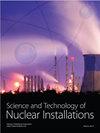Interaction of Mechanical Heterogeneity and Residual Stress on Mechanical Field at Crack Tips in DMWJs
IF 0.9
4区 工程技术
Q3 NUCLEAR SCIENCE & TECHNOLOGY
引用次数: 2
Abstract
The interaction between the mechanical heterogeneity and the residual stress in dissimilar metal welded joints (DMWJs) leads to a complex mechanical field of crack tips, which strongly affects stress corrosion cracking (SCC) behaviors. A dual-field coupling model was established by using the user-defined field (USDFLD) and the predefined stress field method based on the elastoplastic finite element method in this study. Thus, the mechanical heterogeneity and the residual stress of the DMWJ are realized. The influence of the interaction between the mechanical heterogeneity and the residual stress on the mechanical field of crack tips at different locations was investigated. The results show that the mechanical heterogeneity causes the stress and strain distribution on both sides of the crack tip asymmetry. And the residual stress affects the magnitude of the stress and strain around the crack tip. The variation trend of the stress and strain along the crack propagation with crack length is basically the same as that of the residual stress. However, the stress and strain distributions are slightly lagging behind the residual stress distribution due to the redistribution of the residual stress caused by the crack propagation. In addition, the stress and strain range of cracks at different positions with crack length are also different.DMWJs裂纹尖端力学场中力学不均匀性与残余应力的相互作用
异种金属焊接接头的力学非均质性与残余应力的相互作用导致裂纹尖端形成复杂的力学场,对应力腐蚀开裂(SCC)行为产生强烈影响。本研究基于弹塑性有限元法,采用自定义场(USDFLD)和预定义应力场方法建立了双场耦合模型。从而实现了DMWJ的力学非均质性和残余应力。研究了不同位置裂纹尖端的力学非均质性和残余应力相互作用对裂纹尖端力学场的影响。结果表明:力学非均质性导致裂纹尖端两侧应力应变分布不对称;残余应力影响裂纹尖端周围的应力和应变大小。应力和应变随裂纹扩展的变化趋势与残余应力的变化趋势基本一致。然而,由于裂纹扩展引起残余应力的重新分布,应力应变分布略落后于残余应力分布。此外,随着裂纹长度的变化,不同位置裂纹的应力应变范围也不同。
本文章由计算机程序翻译,如有差异,请以英文原文为准。
求助全文
约1分钟内获得全文
求助全文
来源期刊

Science and Technology of Nuclear Installations
NUCLEAR SCIENCE & TECHNOLOGY-
CiteScore
2.30
自引率
9.10%
发文量
51
审稿时长
4-8 weeks
期刊介绍:
Science and Technology of Nuclear Installations is an international scientific journal that aims to make available knowledge on issues related to the nuclear industry and to promote development in the area of nuclear sciences and technologies. The endeavor associated with the establishment and the growth of the journal is expected to lend support to the renaissance of nuclear technology in the world and especially in those countries where nuclear programs have not yet been developed.
 求助内容:
求助内容: 应助结果提醒方式:
应助结果提醒方式:


